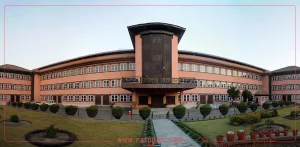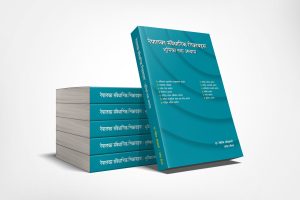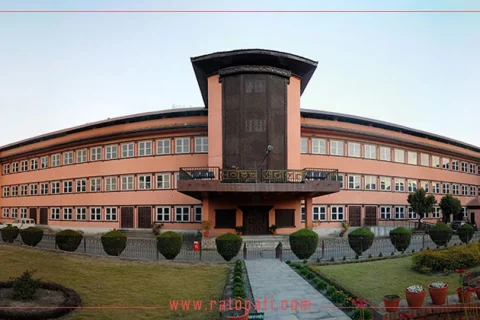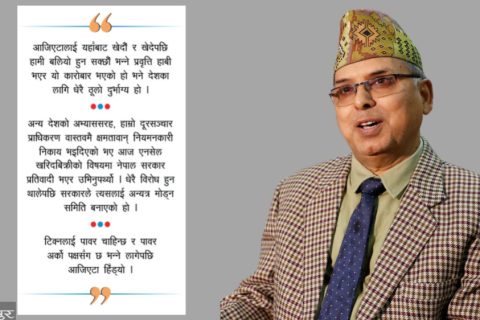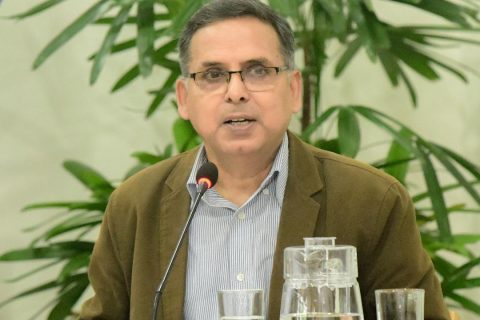Experts say cases on which temporary orders have been issued must be cleared swiftly by conducting the final hearing.
On June 6, 2019 the then KP Sharma Oli government decided to merge Sagarnath Forest Development Project with the Timber Corporation of Nepal. The government of Madhes Province, earlier Province 2, challenged the decision at the Supreme Court, arguing that the federal government had breached the constitutional jurisdiction of the province.
The provincial government said the federal government had no authority to take any decision on the forest project as it came under its jurisdiction. The Constitutional Bench of the court on August 30 that year issued an interlocutory interim order against the federal government, asking it not to implement the decision. Again on December 11 that year, it issued an interim order, continuing the earlier order.
Even more than two and a half years after the first order, the Supreme Court, however, has not passed its final verdict.
It was the first petition by any provincial government against the federal government, challenging the latter’s decision.
“The Madhes Province hasn’t been able to use the forest as the final verdict is yet to come,” Gyanendra Yadav, a former minister for internal affairs and law of the Madhes Province, told the Post. “The provincial government is yet to get the full authority to utilise the resources from the forest. It cannot take any decision regarding the forest without the consent of the federal government.”
The petition, which is crucial to settle the jurisdiction row between the federal and provincial governments, has failed to get priority at the Supreme Court.
In yet another incident, on June 29, 2018, the Oli government announced Maitighar Mandala as a no-protest zone from July 15 onwards. Senior advocate Dinesh Tripathi challenged the decision in the Supreme Court which on July 6 that year asked the government not to implement its decision to ban peaceful protests at public places, including Maitighar Mandala. It gave continuity to its interim order on July 13.
It’s close to four years, but the court has yet to pass the final verdict.
“Though the court intervention was good, as it stopped the government then from implementing its decision, it is wrong that the final verdict has not been issued yet,” Tripathi told the Post. “It didn’t need the Constitutional Bench or the full bench to decide on the matter.”
Had the Supreme Court passed the final verdict on his petition, it could have set a precedent so that no governments could take decisions against peaceful protests, according to Tripathi.
Tripathi said there are dozens of cases on which the final verdicts have not been passed despite the issuance of interim orders.
“At least half a dozen petitions that I have filed are awaiting final verdicts for the last two years,” Tripathi told the Post.
An interim order is a provisional or temporary order that is put into effect pending a final hearing and judgment. Interim orders are usually issued to maintain the status quo—asking parties to continue or halt an action—until the final decision is reached.
Legal experts say though there is no timeframe as to when the court should issue final verdicts on cases for which interim orders have been issued, it is not a good practice to keep the cases pending for years.
“An interim order by its name is a short-term order which shouldn’t be continued for years,” said Raju Prasad Chapagain, a former chairperson of the Constitutional Lawyers’ Forum. “The court must be sensitive about such issues.”
Rule 49 of the Supreme Court Regulations says the interim order is issued whenever there is a possibility that the petitioner might face severe loss until the final verdict or it is necessary to stop an attack on the fundamental right (of somebody).
Officials at the Supreme Court say there is no deadline on final hearings in the cases in which interim orders have been issued.
“The cases are prioritised based on urgency. We are aware that the very purpose of having the court will be defeated if justice is delayed,” Bimal Poudel, a spokesperson at the court, told the Post.
Yadav, the former minister from Madhes, however, doesn’t buy the argument, saying the conflict over the jurisdiction between different tiers of government must be a priority.
“It seems the tenure of the provincial government will be over before the verdict is given,” he said.
The rate of passing the verdicts by the court is not encouraging.
According to the annual report of the court from fiscal year 2019-20, as many as 35,981 cases were in the Supreme Court in the year including 24,180 from the previous year. The court could clear only 31.2o percent cases leaving a baggage of 24,756 cases for the following year. As many as 2,058—around nine percent of the cases—are more than five years old. The case clearance rate in the Constitutional Bench, like the one filed by Madhes Province, is even low with just 25 percent of the petitions finalised in the fiscal year 2019-20.
“The Supreme Court must set a timeline. The cases in which the interim orders have been issued must be a priority,” said Chapagain.
Experts say while prioritizing cases for final hearing, the court should also pay attention to the kind of cases. In cases of public interest litigations, like the one Tripathi filed against the decision to restrict protests in Maitighar, an interim order has worked fine. But, according to experts, in cases like the one filed by Madhes Province against the federal government, the provincial government is facing problems because the court has not passed the final verdict.
Bipin Adhikari, a professor and a former dean at Kathmandu University School of Law, said it is unfair to keep the cases on hold for years after issuing an interim order.
“As interim orders are generally issued without listening to the defendants, it is wrong to keep the cases on hold for years,” said Adhikari. “There has to be reasonable timing to start the final hearings in the cases where interim orders have been issued.”


